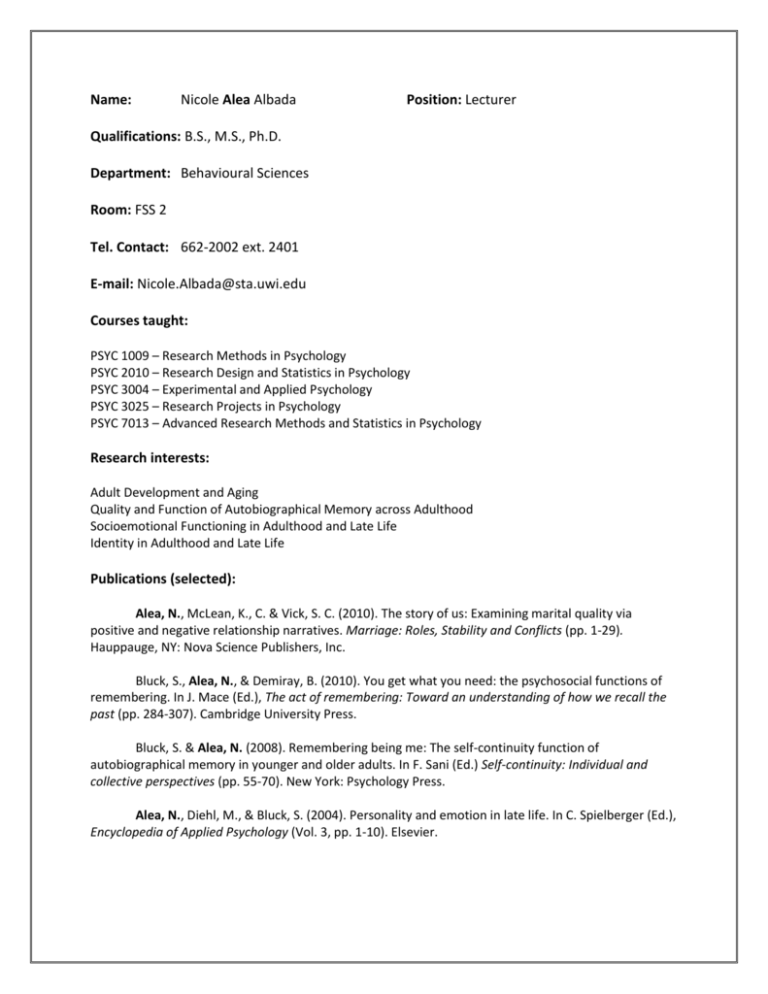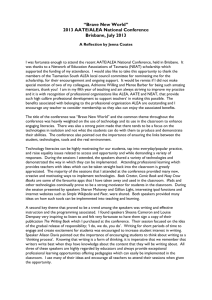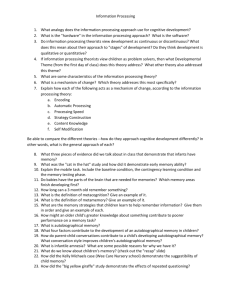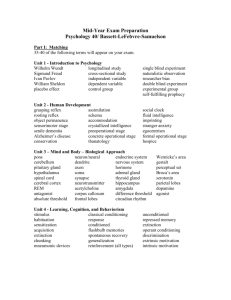Name: Nicole Alea Albada Position: Lecturer
advertisement

Name: Nicole Alea Albada Position: Lecturer Qualifications: B.S., M.S., Ph.D. Department: Behavioural Sciences Room: FSS 2 Tel. Contact: 662-2002 ext. 2401 E-mail: Nicole.Albada@sta.uwi.edu Courses taught: PSYC 1009 – Research Methods in Psychology PSYC 2010 – Research Design and Statistics in Psychology PSYC 3004 – Experimental and Applied Psychology PSYC 3025 – Research Projects in Psychology PSYC 7013 – Advanced Research Methods and Statistics in Psychology Research interests: Adult Development and Aging Quality and Function of Autobiographical Memory across Adulthood Socioemotional Functioning in Adulthood and Late Life Identity in Adulthood and Late Life Publications (selected): Alea, N., McLean, K., C. & Vick, S. C. (2010). The story of us: Examining marital quality via positive and negative relationship narratives. Marriage: Roles, Stability and Conflicts (pp. 1-29). Hauppauge, NY: Nova Science Publishers, Inc. Bluck, S., Alea, N., & Demiray, B. (2010). You get what you need: the psychosocial functions of remembering. In J. Mace (Ed.), The act of remembering: Toward an understanding of how we recall the past (pp. 284-307). Cambridge University Press. Bluck, S. & Alea, N. (2008). Remembering being me: The self-continuity function of autobiographical memory in younger and older adults. In F. Sani (Ed.) Self-continuity: Individual and collective perspectives (pp. 55-70). New York: Psychology Press. Alea, N., Diehl, M., & Bluck, S. (2004). Personality and emotion in late life. In C. Spielberger (Ed.), Encyclopedia of Applied Psychology (Vol. 3, pp. 1-10). Elsevier. Bluck, S. & Alea, N. (2002). Exploring the functions of autobiographical memory: Why do I remember the autumn? In J.D. Webster & B.K. Haight (Eds.), Critical advances in reminiscence work: From theory to application (pp. 61 – 75). New York, NY: Springer Publishing Company. Journal Publications (selected) Alea, N. & Vick, S. C. (2010). The first sight of love: relationship-defining memories and marital satisfaction across adulthood. Memory, 18, 730-742. Alea, N., Thomas, R. A., Manickchand, B., Ramirez-Cole, M., Renaud-Simon, C., & Bacchus, K., (2010). The emotional quality of childhood memories and depression in Trinidadian older adults. Caribbean Journal of Psychology, 3, 4-24. Alea, N. (2009). The prevalence and quality of silent, socially silent, and disclosed autobiographical memories. Memory, 18, 142-158. Bluck, S. & Alea, N. (2009). Characteristics of positive autobiographical memories in adulthood. International Journal of Adulthood and Human Development, 69, 247-265. Bluck, S., & Alea, N. (2009). Thinking and talking about the past: Why remember? Applied Cognitive Psychology: Special Issue: Baddeley Revisited: The Functional Approach to Autobiographical Memory, 23, 1089-1104. Alea, N., Vick, S. C., & Hyatt, A. (2009). The content of older adults’ autobiographical memories predicts the beneficial outcomes of reminiscence group participation. Journal of Adult Development, 17, 135-145. Alea, N. & Bluck, S. (2007). I’ll keep you in mind: The intimacy function of autobiographical memory. Applied Cognitive Psychology, 21, 1091-1111. Bluck, S., Alea, N., Habermas, T., & Rubin, D. C. (2005). A TALE of three functions: the selfreported uses of autobiographical memory. Social Cognition, 23, 91-117. Alea, N., Bluck, S., & Semegon, A. B. (2004). Young and older adults’ expression of emotional experience: Do autobiographical narratives tell a different story? Journal of Adult Development, 11, 235250. Mills, T., Alea, N., & Cheong, J. (2004). Differences in the indicators of depressive symptoms among a community sample of African American and Caucasian older adults. Community Mental Health Journal, 40, 309-331. Alea, N. & Bluck, S. (2003). Why are you telling me that? A conceptual model of the social function of autobiographical memory. Memory, 11, 165 – 178. Professional Involvement: American Psychological Association - Adult Development and Aging – Division 20 Gerontological Society of America Society for Applied Research in Memory and Cognition







